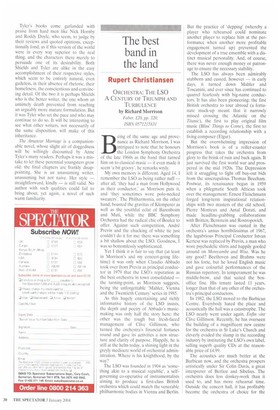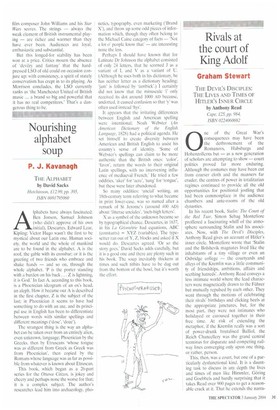The best band in the land
Rupert Christiansen
ORCHESTRA: THE LSO A CENTURY OF TRIUMPH AND TURBULENCE by Richard Morrison Faber, £20, pp. 320, ISBN 0571215831 Being of the same age and provenance as Richard Morrison, I was intrigued to note that he honours the London Symphony Orchestra of the late 1960s as the band that turned him on to classical music — it even made it seem 'a bit groovy', he remarks wryly.
My own memory is different. Aged 14, I remember the LSO as being rather naff — after all. 'they had a man from Hollywood as their conductor,' as Morrison puts it, and 'they sometimes wore polo-necked sweaters'. The Philharmonia, on the other hand, boasted the gravitas of Klemperer as well as the youthful eclat of Barenboim and Muth while the BBC Symphony Orchestra had the radical chic of Boulez to offer. Against such competition, Andre Previn and the chucking of white tie just couldn't do it for me: there was something a bit shallow about the LSO. Goodness, I was so bottomlessly sophisticated. Yet I think it is fair to say that (at least in Morrison's and my concert-going lifetime) it was only when Claudio Abbado took over from Previn as principal conductor in 1979 that the LSO's reputation as the best orchestra in town consolidated — the turning-point, as Morrison suggests, being the unforgettable 'Mahler, Vienna and the Twentieth Century' series in 1985. As this hugely entertaining and richly informative history of the LSO insists, the depth and poetry of Abbado's musicmaking was only half the story here; the other was the tough but fresh-faced management of Clive Gillinson, who turned the orchestra's financial fortunes round and gave its activities a new structure and clarity of purpose. Happily, he is still at the helm today, a shining light in the greyly mediocre world of orchestral administration. Where is his knighthood, by the way? The LSO was founded in 1904 as 'something akin to a musical republic', a selfgoverning co-operative of instrumentalists aiming to produce a first-class British orchestra which could match the venerable philharmonic bodies in Vienna and Berlin. But the practice of `depping' (whereby a player who rehearsed could nominate another player to replace him at the performance when another more profitable engagement turned up) prevented the development of a true ensemble with a distinct musical personality. And, of course, there was never enough money or patronage to ensure the necessary stability. The LSO has always been admirably stubborn and cussed, however — in early days, it turned down Mahler and Toscanini, and ever since has continued to quarrel fearlessly with big-name conductors. It has also been pioneering: the first British orchestra to tour abroad (a fortunate muck-up meant that it narrowly missed crossing the Atlantic on the Titanic), the first to play original film music (Bliss' Things to Come), the first to establish a recording relationship with a living composer (Elgar). But the overwhelming impression of Morrison's book is of a roller-coaster progress that takes the orchestra from glory to the brink of ruin and back again. It just survived the first world war and prospered in the mid 1920s. The Depression left it struggling to fight off buy-out bids from the unscrupulous Thomas Beecham. Postwar, its renaissance began in 1959 when a phlegmatic South African took over the management: Ernest Fleischmann forged long-term inspirational relationships with two masters of the old school. Pierre Monteux and Antal Dorati, and made headline-grabbing collaborations with Britten, Bernstein and Rostropovich, After Fleischmann was ousted in the orchestra's annus horribilissimus of 1967, the lugubrious Principal Conductor Istvan Kertesz was replaced by Previn, a man who wore psychedelic shirts and happily goofed around on Morecambe and Wise. Was he any good? Beethoven and Brahms were not his forte, but he loved English music and gave colourful performances of the Russian repertory. In temperament he was middle-brow, and that suited the boxoffice fine. His tenure lasted 11 years, longer than that of any other of the orchestra's principal conductors. In 1982, the LSO moved to the Barbican Centre. Everybody hated the place and acoustically the hall was a catastrophe. The LSO nearly went under again. Enfin vint Clive Gillinson. Recently, he has overseen the building of a magnificent new centre for the orchestra in St Luke's Church and cleverly evaded the slump in the recording industry by instituting the LSO's own label, selling superb quality CDs at the reasonable price of £4.99. The acoustics are much better at the Barbican now, and the orchestra prospers artistically under Sir Colin Davis, a great interpreter of Berlioz and Sibelius. The orchestra does less donkey-work than it used to, and has more rehearsal time. Outside the concert hall, it has profitably become the orchestra of choice for the film composer John Williams and his Star Wars scores. The strings — always the weak element of British instrumental playing — are richer and warmer than they have ever been. Audiences are loyal, enthusiastic and substantial.
But this longed-for stability has been won at a price. Critics mourn the absence of 'devilry and fantasy' that the hardpressed LSO of old could on occasion conjure up: with consistency, a spirit of stately conservatism has crept in to its playing. As Morrison concludes, the LSO currently ranks as the Manchester United of British music ... a brand so big and powerful that it has no real competitors.' That's a dangerous thing to be.
inommommau



























































 Previous page
Previous page